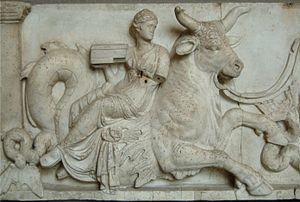Νηρηίς
τὸ πολὺ τοῦ βίου ἐν δικαστηρίοις φεύγων τε καὶ διώκων κατατρίβομαι → waste the greater part of one's life in courts either as plaintiff or defendant
Middle Liddell
Νηρηίς, or Νηρε+ίς, ίδος, ἡ, [from Νηρεύς
a daughter of Nereus, a Nereid or Nymph of the sea, mostly in pl., Νηρηίδες, Hom.; Νηρεΐδες Hes.; Attic Νηρῇδες Soph., Eur.
English (Autenrieth)
ίδος: Nereid, i. e. daughter of Nereus, who is himself not named by Homer, but is only called ἅλιος γέρων, Il. 11.538; pl., Il. 18.38, 49, 52.
Greek Monolingual
(I)
Νηρηΐς, ἡ (Α)
βλ. Νηρηίδα.
(II)
η
αστρον. ο δεύτερος, εξωτερικός και πιό μικρός από τους δύο γνωστούς δορυφόρους του πλανήτη Ποσειδώνα.
[ΕΤΥΜΟΛΟΓΙΑ Αντιδάνεια λ., πρβλ. γαλλ. Nereide].
Wikipedia EN
In Greek mythology, the Nereids (/ˈnɪəriɪdz/ NEER-ee-idz; Greek: Νηρηΐδες Nereides, sg. Νηρηΐς Nereis) are sea nymphs (female spirits of sea waters), the 50 daughters of Nereus and Doris, sisters to Nerites. They often accompany Poseidon, the god of the sea, and can be friendly and helpful to sailors, like the Argonauts in their search for the Golden Fleece.
Nereids are particularly associated with the Aegean Sea, where they dwelt with their father Nereus in the depths within a golden palace. The most notable of them are Thetis, wife of Peleus and mother of Achilles; Amphitrite, wife of Poseidon and mother of Triton; and Galatea, the vain love interest of the Cyclops Polyphemus.
They symbolized everything that is beautiful and kind about the sea. Their melodious voices sang as they danced around their father. They are represented as very beautiful girls, crowned with branches of red coral and dressed in white silk robes trimmed with gold, but who went barefoot. They were part of Poseidon's entourage and carried his trident.
In Homer's Iliad XVIII, when Thetis cries out in sympathy for the grief of Achilles for the slain Patroclus, her sisters appear. The Nereid Opis is mentioned in Virgil's Aeneid. She is called by the goddess Diana to avenge the death of the Amazon-like female warrior Camilla. Diana gives Opis magical weapons for revenge on Camilla's killer, the Etruscan Arruns. Opis sees and laments Camilla's death and shoots Arruns in revenge as directed by Diana.
Wikipedia DE
Nereïden (griechisch Νηρεΐδες, Νηρηίδες, Einzahl die Nereïde Νηρηίς, e und i getrennt gesprochen) sind in der griechischen Mythologie die 50 Töchter des Nereus und der Doris. In Platons Kritias hingegen taucht als Anzahl 100 auf, mit der Einschränkung, dass die Anzahl als vermutet bezeichnet wird.
Translations
af: Nereïde; ar: نيريد; az: Nereidalar; bg: Нереиди; br: Nereidezed; ca: Nereides; cs: Néreovny; cy: Nereid (mytholeg); da: Nereide; de: Nereide (Mythologie); el: Νηρηίδες; en: Nereid; eo: Nereidinoj; es: Nereidas; et: Nereiidid; eu: Nereida; fa: نرئید; fi: Nereidi; fr: Néréides; gl: Nereidas; hr: Nerejide; hu: Néreiszek; hy: Ներեուհիներ; id: Nereid; io: Nereidi; it: Nereidi; ja: ネーレーイス; ka: ნერეიდა (მითოლოგია); ko: 네레이데스; la: Nereides; lb: Nereiden; lfn: Nimfa de acua; lt: Nereidės; nl: Nereïden; no: Nereider; pl: Nereidy; pt: Nereida; ro: Nereide; ru: Нереиды; sco: Nereid; sh: Nereide; simple: Nereid; sl: Nereide; sr: Нереиде; sv: Nereider; th: เนียรีอิด; tr: Nereid; uk: Нереїди; ur: سمندری دیوی; vi: Nữ thần biển; zh: 涅瑞伊得斯

